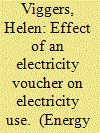|
|
|
Sort Order |
|
|
|
Items / Page
|
|
|
|
|
|
|
| Srl | Item |
| 1 |
ID:
169733


|
|
|
|
|
| Summary/Abstract |
The aim of this paper is to examine the effect of receiving a voucher for electricity on the electricity use of a household. The Warm Homes for Elder New Zealanders Study was a randomised controlled trial which gave participants aged over 55 with chronic obstructive pulmonary disease a voucher providing NZ$500 credit to their electricity account for one winter. Electricity use increased over the winter the participant received the voucher. Participants with lower initial electricity use increased their consumption by about 10%, those with medium- or high-initial use by 2–3%. However, most participants did not use the entire value of the voucher on additional electricity. The study involved only a small informational component: this consisted of a brochure sent to the participants to encourage them to increase their energy use. This was designed to mimic the effects of a possible widespread rollout of this programme. The policy implication of this analysis is that a winter energy voucher accompanied by minimal education was effective at increasing winter energy use among a vulnerable sub-population with a health condition that merited additional heating in winter.
|
|
|
|
|
|
|
|
|
|
|
|
|
|
|
|
| 2 |
ID:
115640


|
|
|
|
|
| Publication |
2012.
|
| Summary/Abstract |
About a quarter of New Zealand households are estimated to be in fuel poverty. NZ has a poor history of housing regulation, so existing houses are often poorly insulated and rental properties are not required to have insulation or heating. Average indoor temperatures are cold by international standards and occupants regularly report they are cold, because they cannot afford to heat their houses. Fuel poverty is thought to be a factor in NZ's high rate of excess winter mortality (16%, about 1600 deaths a year) and excess winter hospitalisations (8%).
We examined the link between indoor cold and health in two community trials, the Housing, Insulation, and Health Study and the Housing, Heating, and Health Study and both interventions demonstrated encouraging benefit/cost ratios. NZ governments have translated this and other research into major policy programmes designed to retrofit insulation and efficient heating into existing houses. However, houses are predominantly electrical resistance heated and a largely unregulated electricity market has seen rapidly rising residential electricity prices. These rising energy prices, combined with low rates of economic growth, rising unemployment and generally rising income inequality, are likely to further increase levels of fuel poverty in NZ, unless broader policy action is taken.
|
|
|
|
|
|
|
|
|
|
|
|
|
|
|
|
| 3 |
ID:
090054


|
|
|
|
|
| Publication |
2009.
|
| Summary/Abstract |
New Zealand houses are large, often poorly constructed and heated, by OECD standards, and consequently are colder and damper indoors than recommended by the World Health Organisation. This affects both the energy consumption and the health of households. The traditional New Zealand household pattern of only heating one room of the house has been unchanged for decades, although there has been substantial market penetration of unflued gas heaters and more recently heat pumps. This paper describes the residential sector and the results of two community-based trials of housing and heating interventions that have been designed to measure the impact of (1) retrofitting insulation and (2) replacing unflued gas heaters and electric resistance heaters with heat pumps, wood pellet burners and flued gas heaters. The paper describes findings on the rebound effect or 'take-back'-the extent to which households take the gains from insulation and heating improvements as comfort (higher temperatures) rather than energy savings, and compares energy-saving patterns with those suggested by an earlier study. Findings on these aspects of household space heating are discussed in the context of the New Zealand government's policy drive for a more sustainable energy system, and the implications for climate change policy.
|
|
|
|
|
|
|
|
|
|
|
|
|
|
|
|
|
|
|
|
|